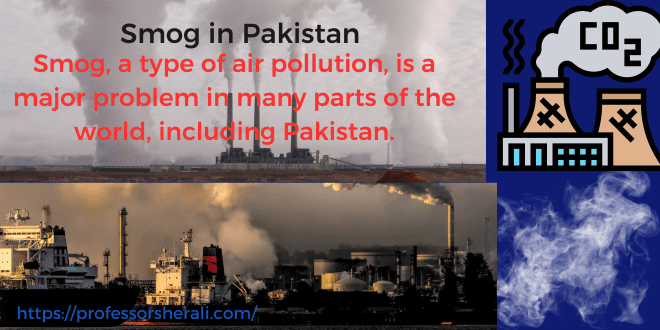0
Smog, a type of air pollution, is a major problem in many parts of the world, including Pakistan. It is a mixture of smoke, fog, and chemical fumes, which creates a hazy, unhealthy environment. In recent years, smog has become a severe concern in Pakistan, particularly in the winter season. The following article will discuss the reasons of the smog in Pakistan.
Industrial Emissions
The first reason for smog in Pakistan is industrial emissions. The country’s industrial sector is growing rapidly, and with it comes the increase in air pollution which cause smog in Pakistan. Industries release a variety of pollutants, including sulfur dioxide, nitrogen oxides, and particulate matter, which contribute a large to reasons of smog in Pakistan. These emissions are often unchecked and unregulated, making it difficult to control their impact on the environment.
Transportation
The transportation sector is another significant contributor to smog in Pakistan. The increasing number of cars and trucks on the roads is adding to the reasons of smog in Pakistan. The vehicles emit harmful pollutants such as carbon monoxide, nitrogen oxides, and particulate matter, which mix with other pollutants in the air to form smog in Pakistan.
Agricultural Practices
The third reason for smog in Pakistan is agricultural practices. The country is heavily reliant on agriculture, and farmers burn crop residues after the harvest season to clear the land for the next crop. This practice releases large amounts of smoke and particulate matter into the air, contributing to the smog problem.
Weather Conditions
Weather conditions also play a role in the smog problem in Pakistan. During the winter season, cool air traps pollutants close to the ground, preventing them from dispersing into the atmosphere. This creates a layer of smog that can be hazardous to human health.
Lack of Awareness and Regulations
The lack of awareness and regulations also contribute to the smog problem in Pakistan. Many people are not aware of the harmful effects of smog and its long-term impact on human health. Additionally, the government has been slow to implement and enforce regulations that would limit pollution levels in the country.
Burning of Fossil Fuels
The burning of fossil fuels, such as coal and oil, is a major contributor to smog in Pakistan. Many industries, as well as households, use fossil fuels for heating and electricity, releasing harmful pollutants into the air. The burning of fossil fuels also releases carbon dioxide, which contributes to global warming.
Open Waste Burning
Open waste burning is another significant contributor to smog in Pakistan. Municipal waste, agricultural waste, and other types of waste are often burned openly, releasing a large amount of smoke and particulate matter into the air. This practice is particularly prevalent in urban areas, where waste management systems are often inadequate.
Construction Activities
Construction activities also contribute to the smog problem in Pakistan. Dust from construction sites, as well as emissions from heavy machinery and trucks, add to the pollution levels in the air. Construction activities are often unregulated and unchecked, exacerbating the problem.
Natural Factors
Natural factors, such as dust storms and forest fires, can also contribute to smog in Pakistan. Dust storms, which are common in arid regions of the country, can stir up large amounts of dust and particulate matter. Forest fires, particularly in neighboring countries such as India, can also contribute to the smog problem in Pakistan.
Topography
The topography of Pakistan also plays a role in the smog problem. The country is surrounded by mountains, which can trap pollutants close to the ground, preventing them from dispersing into the atmosphere. This can lead to the formation of smog in urban areas, particularly during the winter season.
In conclusion, smog is a complex problem in Pakistan, and there are multiple reasons behind its expanding. Presenting these issues will require a comprehensive and sustained working from the government, industries, and the public. By implementing regulations, promoting sustainable practices, and raising awareness about the harmful effects of smog, it may be possible to mitigate the problem and improve air quality in the country.

 Professor Sher Ali My site
Professor Sher Ali My site